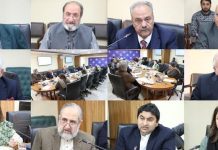ISLAMABAD, OCT 24 – The Centre for Strategic Perspectives (CSP) at the Institute of Strategic Studies Islamabad (ISSI) convened a high-level roundtable discussion titled “Pakistan’s Climate Negotiation Strategy and Preparations for COP-30.” The session brought together senior policymakers, diplomats, and climate experts, including Ambassador Sohail Mahmood, Director General Institute of Strategic Studies Islamabad (ISSI); Ambassador Khalid Mahmood, Chairman Board of Governors ISSI; Mr. Jamil Ahmad, Director, Intergovernmental Affairs at UNEP-Washington; Ms. Nadia Rehman, Member Climate Change, Ministry of Planning, Development and Special Initiatives; Ms. Sadia Munawar, Deputy Director, Ministry of Climate Change; and Ms. Kashmala Kakakhel, climate finance expert.
Opening the session, Dr. Neelum Nigar welcomed the participants and underscored the importance of revisiting Pakistan’s climate strategy ahead of COP-30 in Belem, Brazil, to ensure that the country’s commitments are aligned with its developmental needs and climate vulnerabilities. She noted that Pakistan, having suffered another round of devastating floods in 2025, stands at a critical juncture where adaptation and equitable climate finance must become national priorities.
In his welcome remarks, Ambassador Sohail Mahmood emphasized that COP-30 marks a defining moment in global climate diplomacy one where the world must shift decisively from promises to performance. He noted that for Pakistan, a country contributing minimally to global emissions yet among the most climate-vulnerable, the outcomes of COP-30 would be of profound consequence. Ambassador Sohail highlighted that since COP-29, Pakistan has made tangible progress, including finalizing its National Adaptation Plan (2025–2030) and launching the Pakistan Climate Resilience Financing Framework to enhance access to international funds. The expansion of renewable energy projects and strengthening of institutional coordination, he added, signify Pakistan’s growing commitment to a coherent and inclusive climate response.
He further stressed that Pakistan’s approach to COP-30 would be guided by pragmatism, equity, and partnership advocating for equitable access to climate finance, operationalization of the Loss and Damage Fund, technology transfer, and South-South cooperation. Reaffirming Pakistan’s adherence to the principle of common but differentiated responsibilities (CBDR), he noted that global climate action must not place equal burdens on those least responsible for emissions. He urged that Pakistan’s climate diplomacy be leveraged to attract investment, technologies, and partnerships that could advance resilience and promote green growth.
Climate change, he remarked, is not a distant or abstract threat it is an immediate existential challenge demanding coherent and consistent national and international responses. He reiterated the urgency of investing in resilience, early-warning systems, and climate-smart development, concluding that the roundtable was an opportunity to strengthen Pakistan’s voice and preparedness for COP-30.
Delivering a video message, Mr. Jamil Ahmad of UNEP observed that COP-30, dubbed the COP of Implementation, must convert commitments into measurable action, particularly for vulnerable nations like Pakistan. He commended Pakistan’s Living Indus Initiative as a model for linking water security, biodiversity, and livelihoods, and urged that national and local governments alike translate global goals into community-level action.
From the government side, Ms. Nadia Rehman highlighted that Pakistan’s negotiation strategy has traditionally aligned with the G-77 and Gulf states but called for a more issue-based approach centred on technology transfer and climate finance. She underlined the need to redefine sovereign risk assessments and credit-rating mechanisms to unlock concessional financing and reduce borrowing costs for developing countries.
Ms. Sadia Munawar, representing the Ministry of Climate Change, detailed Pakistan’s multi-tiered preparations for COP-30, including national and provincial participation, thematic events, and side sessions. She informed that all provinces Punjab, Sindh, KP, Balochistan, Gilgit-Baltistan, and AJK would showcase their climate resilience initiatives in Brazil. She reaffirmed that Pakistan aims to increase its renewable energy share to 60% by 2030, expand green financing instruments, and ensure that COP participation translates into tangible adaptation outcomes for communities.
Ms. Kashmala Kakakhel provided a candid assessment of Pakistan’s climate readiness, noting that while the country has made strides in climate governance, it must sharpen its negotiation focus. She emphasized that Pakistan cannot borrow its way into resilience and must push for grant-based and programmatic funding under mechanisms like the Loss and Damage Fund. She also urged greater engagement with the private sector and academic institutions to build indigenous technological solutions rather than relying solely on technology transfer.
The ensuing discussion featured thought-provoking interventions from diplomats, experts, and civil society representatives, who stressed the need for stronger national commitment, regional cooperation to address transboundary pollution, and grassroots awareness campaigns. Participants underscored that Pakistan’s climate policy should not remain reactive but evolve into a proactive framework rooted in innovation, local adaptation, and institutional coherence.
In closing, Ambassador Khalid Mahmood thanked all speakers and participants, reaffirming ISSI’s commitment to fostering informed debate and policy dialogue on Pakistan’s climate priorities. He noted that insights from the roundtable would feed into Pakistan’s preparatory work for COP-30 and beyond.

















